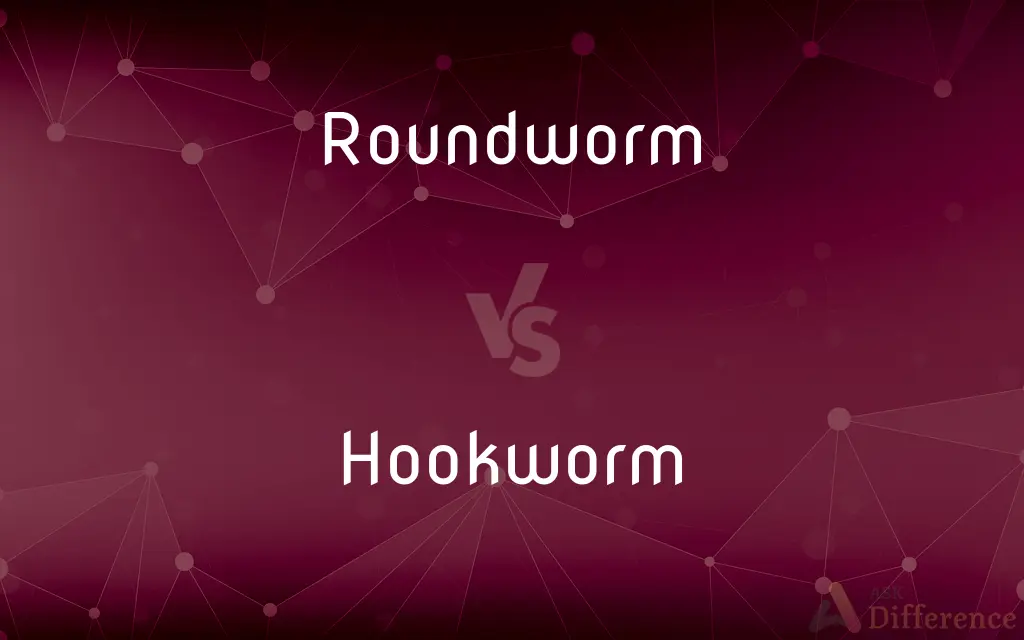Roundworm vs. Hookworm — What's the Difference?
Edited by Tayyaba Rehman — By Maham Liaqat — Updated on April 17, 2024
Roundworm and hookworm are both parasitic nematodes, but roundworms typically reside in the host's intestine causing symptoms like malnutrition, while hookworms attach to the intestinal walls and cause anemia.

Difference Between Roundworm and Hookworm
Table of Contents
ADVERTISEMENT
Key Differences
Roundworms, scientifically known as Ascaris lumbricoides, are a common type of parasitic nematode infecting the intestines of various hosts, primarily humans. These worms are typically ingested as eggs from contaminated soil and can grow up to 40 cm in length. Conversely, hookworms, including species like Ancylostoma duodenale and Necator americanus, are smaller parasites that also infect the intestines but differ in their method of entry, often penetrating the skin from contaminated soil and then migrating to the intestines.
While both parasites live in the intestines, roundworms float freely and consume the host's partially digested food, leading to nutritional deficiencies and intestinal blockages. Hookworms, on the other hand, attach themselves to the intestinal walls using their hook-like mouths, leading to blood loss and resulting in anemia and protein deficiency in the host.
Roundworm infections are typically diagnosed through the detection of eggs or worms in stool samples and can cause visible symptoms such as a swollen abdomen and significant nutritional problems. Hookworm infections may be more insidious, often diagnosed through signs of anemia and microscopic examination of stool samples, and can cause severe fatigue and weakness due to blood loss.
Treatment for both infections involves antiparasitic medications, such as albendazole and mebendazole. These treatments are effective but may need to be repeated to fully eradicate the worms.
Prevention of both types of infections centers on improving sanitation and hygiene, particularly in areas where the soil may be contaminated. Public health measures and personal precautions, such as wearing shoes and avoiding untreated fecal matter, are crucial.
ADVERTISEMENT
Comparison Chart
Size
Up to 40 cm long
Smaller, about 1 cm long
Mode of Entry
Ingestion of eggs from contaminated soil
Skin penetration from contaminated soil, then migration to intestines
Location in Host
Floats freely in the intestine
Attaches to the intestinal walls
Primary Symptoms
Nutritional deficiencies, intestinal blockage
Blood loss, anemia, protein deficiency
Diagnosis
Eggs or worms in stool
Anemia symptoms, eggs in stool
Treatment
Antiparasitic medications (e.g., albendazole, mebendazole)
Same as roundworm, with possible iron supplements
Prevention
Improved sanitation, hygiene
Same, with emphasis on wearing shoes and protecting skin
Compare with Definitions
Roundworm
Can lead to serious health issues if untreated.
Severe roundworm infection can cause intestinal blockage and require surgical intervention.
Hookworm
Known for entering through the skin.
Walking barefoot on contaminated soil can lead to a hookworm infection.
Roundworm
A type of large intestinal worm or nematode, causing nutritional issues.
Children in impoverished areas are particularly susceptible to roundworm infections.
Hookworm
A small parasitic hook-like worm that causes blood loss.
Hookworm infections are prevalent among farmers in tropical regions due to direct soil contact.
Roundworm
Detected by the presence of large, visible eggs or worms in feces.
Routine stool tests can help diagnose roundworm infestation.
Hookworm
Causes chronic anemia and fatigue.
His prolonged fatigue was diagnosed as a symptom of hookworm infection.
Roundworm
Known for causing widespread infections globally.
Roundworm is a major concern in areas with poor sanitation.
Hookworm
Detected through signs of anemia and stool tests.
Blood tests and stool samples are used together to confirm hookworm presence.
Roundworm
Treatment involves specific antiparasitic medications.
She was prescribed albendazole to treat her roundworm infection.
Hookworm
Treatment may include iron supplements along with antiparasitics.
Along with antiparasitic treatment, he received iron supplements to combat anemia caused by hookworms.
Roundworm
See nematode.
Hookworm
Hookworms are intestinal, blood-feeding, parasitic roundworms that cause types of infection known as helminthiases. Hookworm infection is found in many parts of the world, and is common in areas with poor access to adequate water, sanitation, and hygiene.
Roundworm
An invertebrate animal of the phylum Nematoda and other similar phyla. Many species of roundworms are parasites.
Hookworm
Any of numerous small parasitic nematode worms of the family Ancylostomatidae having hooklike mouthparts with which they fasten to the intestinal walls and suck the blood of humans and other animals.
Roundworm
A nematoid worm.
Hookworm
Any of various parasitic bloodsucking roundworms which cause disease, especially the species Ancylostoma duodenale and Necator americanus, having hooked mouthparts and entering their hosts by boring through the skin.
Roundworm
Infections of the skin or nails caused by fungi and appearing as itching circular patches
Hookworm
Parasitic blood-sucking roundworms having hooked mouth parts to fasten to the intestinal wall of human and other hosts
Roundworm
Unsegmented worms with elongated rounded body pointed at both ends; mostly free-living but some are parasitic
Hookworm
Infestation of the intestines by hookworms which enter the body (usually) through the skin
Common Curiosities
Are roundworm and hookworm treatable?
Yes, both are treatable with antiparasitic drugs, although repeated treatments and supportive care like iron supplementation for hookworm may be necessary.
Can roundworm and hookworm infections be prevented?
Yes, both infections can be prevented with improved sanitation, personal hygiene, and in the case of hookworm, wearing shoes in endemic areas.
What are the common symptoms of hookworm infection?
Common symptoms include fatigue, anemia, and sometimes gastrointestinal distress, depending on the severity of the infection.
Can these worms be seen in the stool?
Roundworms, due to their size, can sometimes be seen with the naked eye, while hookworms are generally too small and require microscopic identification.
Which is more dangerous, roundworm or hookworm?
Both can be quite harmful, but hookworm is often more insidious due to causing silent anemia and chronic protein loss.
What public health measures help reduce these infections?
Public health measures include improving sanitation, promoting handwashing, providing education on proper toilet use, and sometimes mass deworming campaigns.
What are the signs of a roundworm infection?
Visible signs can include a swollen abdomen, visible worms in stool, and sometimes respiratory symptoms if young worms migrate through the lungs.
How do roundworm and hookworm infections spread?
Roundworm infections spread through ingesting contaminated soil, often via dirty hands or food, while hookworms usually infect through skin contact with contaminated soil.
Who is at risk for these infections?
Individuals in tropical and subtropical regions with poor sanitation are at higher risk, especially where there is contact with contaminated soil.
How long do these worms live in the human body?
Both roundworm and hookworm can live for 1-2 years in the human body without treatment.
Share Your Discovery

Previous Comparison
Hindi vs. Urdu
Next Comparison
Normal vs. StrangeAuthor Spotlight
Written by
Maham LiaqatEdited by
Tayyaba RehmanTayyaba Rehman is a distinguished writer, currently serving as a primary contributor to askdifference.com. As a researcher in semantics and etymology, Tayyaba's passion for the complexity of languages and their distinctions has found a perfect home on the platform. Tayyaba delves into the intricacies of language, distinguishing between commonly confused words and phrases, thereby providing clarity for readers worldwide.















































